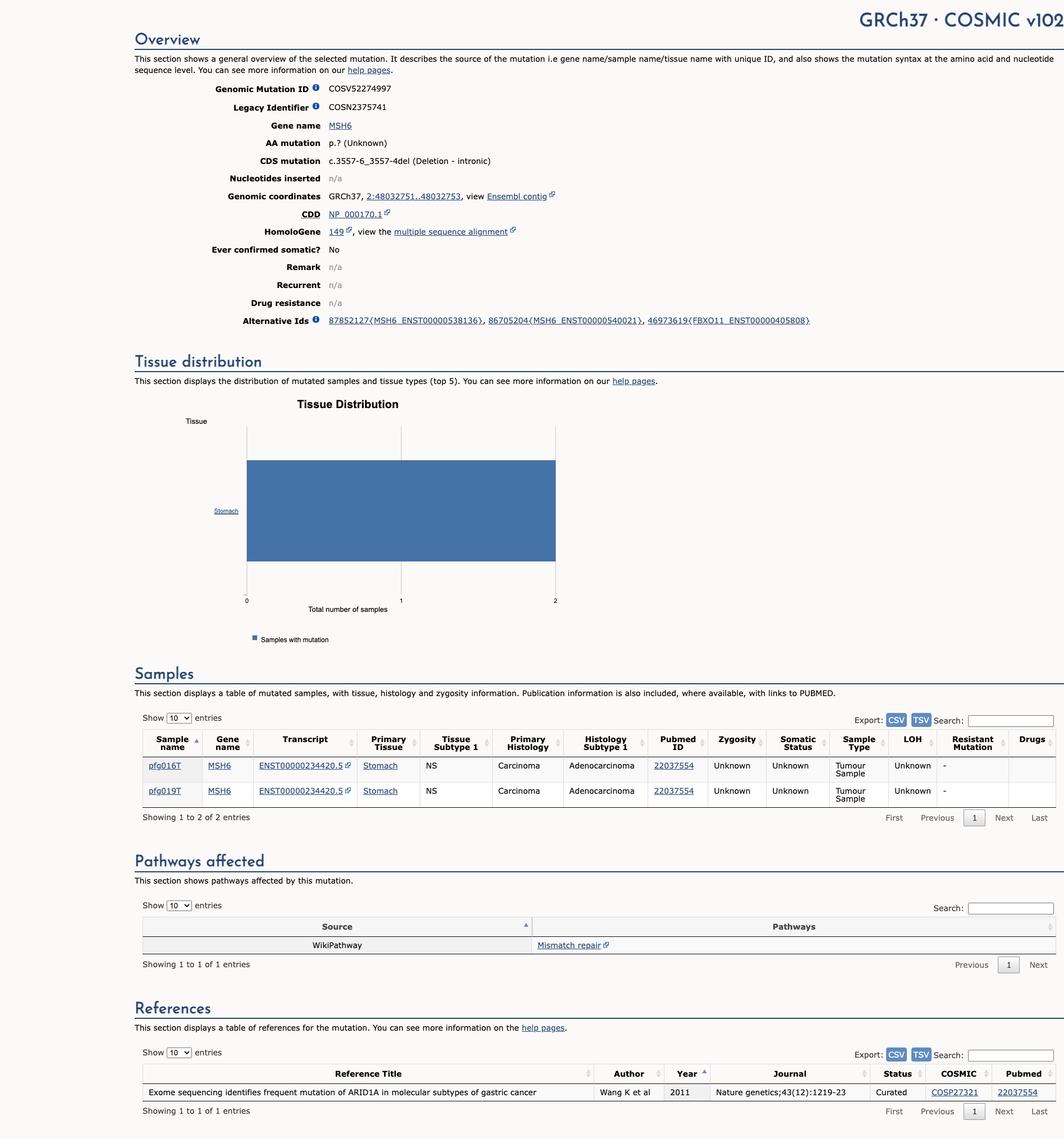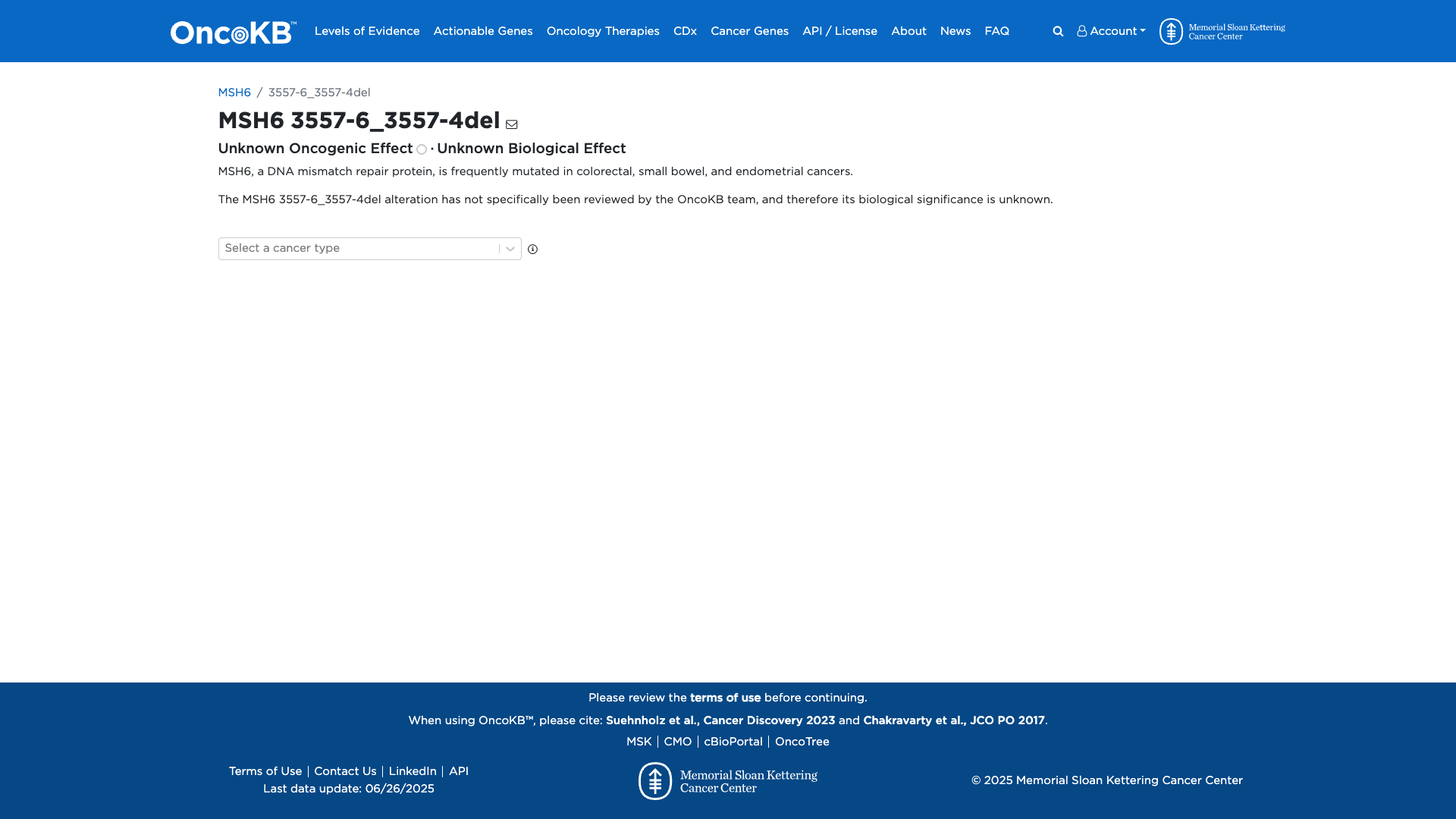MSH6 c.3557-6_3557-4del, p.?
NM_000179.3:c.3557-6_3557-4del
COSMIC ID: COSN2375742
Likely Benign
This intronic deletion is extremely rare, lacks predicted splice impact, and is classified as benign by reputable sources. Combined benign supporting evidence (BP4, BP6) and absence of pathogenic evidence support a Likely Benign classification.
ACMG/AMP Criteria Applied
PM2
BP4
BP6
Genetic Information
Gene & Transcript Details
Gene
MSH6
Transcript
NM_000179.3
MANE Select
Total Exons
10
Strand
Forward (+)
Reference Sequence
NC_000002.11
Alternative Transcripts
| ID | Status | Details |
|---|---|---|
| NM_000179.2 | RefSeq Select | 10 exons | Forward |
| NM_000179.1 | Alternative | 10 exons | Forward |
Variant Details
HGVS Notation
NM_000179.3:c.3557-6_3557-4del
Protein Change
?
Location
Exon 6
(Exon 6 of 10)
5'Exon Structure (10 total)3'
Functional Consequence
Loss of Function
Related Variants
Alternate Identifiers
COSN2375742
Variant interpretation based on transcript NM_000179.3
Genome Browser
Loading genome browser...
HGVS InputNM_000179:c.3557-6_3557-4del
Active Tracks
ConservationRefSeqClinVargnomAD
Navigation tips: Use mouse to drag and zoom. Click on features for details.
Clinical Data
Global Frequency
0.00514%
Rare
Highest in Population
African/African American
0.0226%
Low Frequency
Global: 0.00514%
African/African American: 0.0226%
0%
0.05%
0.1%
1%
5%
10%+
Allele Information
Total: 136078Alt: 7Homozygotes: 0
ACMG Criteria Applied
PM2
This variant is present in gnomAD (MAF= 0.00514%, 7/136078 alleles, homozygotes = 0) and at a higher frequency in the African/African American population (MAF= 0.0226%, 2/8864 alleles, homozygotes = 0). The variant is rare (MAF < 0.1%), supporting PM2 criterion application.
Classification
1 publications
Likely Benign
Based on 2 submitter reviews in ClinVar
Submitter Breakdown
1 LB
1 B
Pathogenic
Likely Path.
VUS
Likely Benign
Benign
Publications (1)
This variant is considered benign. This variant is intronic and is not expected to impact mRNA splicing. This variant is strongly associated with less severe personal and family histories of cancer, typical for individuals without pathogenic variants in this gene [PMID: 27363726].
Clinical Statement
This variant has been reported in ClinVar as Likely benign (1 clinical laboratories) and as Benign (1 clinical laboratories).
Functional Impact
Functional Domain
Hotspot Status
Not a hotspot
Domain Summary
This variant is not located in a mutational hotspot or critical domain (0 mutations).
Related Variants in This Domain
Computational Analysis
Pathogenicity Predictions
Predictor Consensus
Unknown
PP3 Applied
No
VCEP Guidelines
Applied ACMG/AMP Criteria (VCEP Specific) VCEP Guidelines
PVS1
PVS1 (Not Applied) Strength Modified
According to VCEP guidelines, PVS1 applies to canonical splice site variants at IVS±1 or ±2 or confirmed splice defects. The evidence for this variant (c.3557-6_3557-4del) shows it is located at IVS−6 to −4 with no predicted splice impact. Therefore, this criterion is not applied because the variant is non-canonical and no splicing defect is predicted.
PS1
PS1 (Not Applied) Strength Modified
According to standard ACMG guidelines, PS1 requires a missense change encoding the same amino acid as a known pathogenic variant. The evidence for this variant shows it is intronic with no amino acid change. Therefore, PS1 is not applied.
PS2
PS2 (Not Applied) Strength Modified
According to standard ACMG guidelines, PS2 requires confirmed de novo occurrence. The evidence for this variant shows no de novo data. Therefore, PS2 is not applied.
PS3
PS3 (Not Applied) Strength Modified
According to standard ACMG guidelines, PS3 requires well-established functional studies showing a damaging effect. The evidence for this variant shows no functional characterization. Therefore, PS3 is not applied.
PS4
PS4 (Not Applied) Strength Modified
According to standard ACMG guidelines, PS4 requires case-control or prevalence data showing increased occurrence in affected individuals. No such data are available for this variant. Therefore, PS4 is not applied.
PM1
PM1 (Not Applied) Strength Modified
According to standard ACMG guidelines, PM1 applies to variants in mutational hot spots or well-established functional domains without benign variation. The evidence for this variant shows it is intronic outside known functional domains. Therefore, PM1 is not applied.
PM2
PM2 (Supporting) Strength Modified
According to VCEP guidelines, PM2 supporting strength applies to variants absent/extremely rare (<1 in 50,000 alleles) in gnomAD v4. The evidence for this variant shows a MAF of 0.00514% (7/136078 alleles). Therefore, PM2 is applied at Supporting strength because the variant is extremely rare in gnomAD.
PM3
PM3 (Not Applied) Strength Modified
According to standard ACMG guidelines, PM3 applies to variants observed in trans with a pathogenic variant in a recessive disorder. The evidence for this variant shows no recessive inheritance or trans co-occurrence. Therefore, PM3 is not applied.
PM4
PM4 (Not Applied) Strength Modified
According to standard ACMG guidelines, PM4 applies to protein length changes or in-frame indels. The evidence for this variant shows no coding sequence alteration. Therefore, PM4 is not applied.
PM5
PM5 (Not Applied) Strength Modified
According to standard ACMG guidelines, PM5 applies to novel missense changes at residues with known pathogenic missense variants. The evidence for this variant shows it is not a missense change. Therefore, PM5 is not applied.
PM6
PM6 (Not Applied) Strength Modified
According to standard ACMG guidelines, PM6 applies to assumed de novo variants without confirmation. The evidence for this variant shows no de novo information. Therefore, PM6 is not applied.
PP1
PP1 (Not Applied) Strength Modified
According to standard ACMG guidelines, PP1 requires co-segregation with disease in multiple affected family members. The evidence for this variant shows no segregation data. Therefore, PP1 is not applied.
PP2
PP2 (Not Applied) Strength Modified
According to standard ACMG guidelines, PP2 applies to missense variants in a gene with low rate of benign missense variation. The evidence for this variant shows it is intronic. Therefore, PP2 is not applied.
PP3
PP3 (Not Applied) Strength Modified
According to VCEP guidelines, PP3 supporting strength would apply for predicted splice defect with SpliceAI delta ≥0.2. The evidence for this variant shows SpliceAI delta scores ≤0.01 indicating no splice defect. Therefore, PP3 is not applied.
PP4
PP4 (Not Applied) Strength Modified
According to VCEP guidelines, PP4 requires evidence from tumor studies (e.g., MSI-H or protein loss) consistent with variant location. The evidence for this variant shows no tumor phenotype data. Therefore, PP4 is not applied.
PP5
PP5 (Not Applied) Strength Modified
According to standard ACMG guidelines, PP5 applies to reputable source classification as pathogenic without evidence. The evidence for this variant shows ClinVar reports benign/likely benign. Therefore, PP5 is not applied.
BA1
BA1 (Not Applied) Strength Modified
According to VCEP guidelines, BA1 applies to variants with GrpMax filtering allele frequency ≥0.22% in gnomAD v4. The evidence for this variant shows MAF 0.00514%. Therefore, BA1 is not applied.
BS1
BS1 (Not Applied) Strength Modified
According to VCEP guidelines, BS1 applies to variants with GrpMax filtering allele frequency ≥0.022% and <0.22%. The evidence for this variant shows MAF 0.00514%. Therefore, BS1 is not applied.
BS2
BS2 (Not Applied) Strength Modified
According to VCEP guidelines, BS2 requires co-occurrence in trans with a pathogenic variant in LS without CMMRD. The evidence for this variant shows no such data. Therefore, BS2 is not applied.
BS3
BS3 (Not Applied) Strength Modified
According to standard ACMG guidelines, BS3 requires functional studies showing no damaging effect. The evidence for this variant shows no functional assay data. Therefore, BS3 is not applied.
BS4
BS4 (Not Applied) Strength Modified
According to standard ACMG guidelines, BS4 requires lack of segregation with disease. The evidence for this variant shows no segregation studies. Therefore, BS4 is not applied.
BP1
BP1 (Not Applied) Strength Modified
According to standard ACMG guidelines, BP1 applies to missense variants in genes where truncating variants cause disease. The evidence for this variant shows it is intronic. Therefore, BP1 is not applied.
BP2
BP2 (Not Applied) Strength Modified
According to standard ACMG guidelines, BP2 applies to observed in cis with a pathogenic variant or in trans in dominant disorder. The evidence for this variant shows no co-occurrence data. Therefore, BP2 is not applied.
BP3
BP3 (Not Applied) Strength Modified
According to standard ACMG guidelines, BP3 applies to in-frame indels in repetitive regions without known function. The evidence for this variant shows a small intronic deletion outside repetitive sequence context. Therefore, BP3 is not applied.
BP4
BP4 (Supporting)
According to VCEP guidelines, BP4 supporting strength applies for intronic variants where SpliceAI predicts no splicing impact with delta score ≤0.1. The evidence for this variant shows SpliceAI delta score 0.01. Therefore, BP4 is applied at Supporting strength because computational tools predict no splice impact.
BP5
BP5 (Not Applied) Strength Modified
According to standard ACMG guidelines, BP5 applies to variant found in a case with alternate molecular basis for disease. The evidence for this variant shows no such case. Therefore, BP5 is not applied.
BP6
BP6 (Supporting)
According to standard ACMG guidelines, BP6 supporting strength applies when a reputable source reports the variant as benign without available evidence. The evidence for this variant shows ClinVar entries as benign/likely benign from two laboratories. Therefore, BP6 is applied at Supporting strength because reputable sources classify the variant as benign.
BP7
BP7 (Not Applied) Strength Modified
According to VCEP guidelines, BP7 applies to synonymous or intronic variants at or beyond −21/+7. The evidence for this variant shows localization at −6 to −4, which is within the critical region. Therefore, BP7 is not applied.



